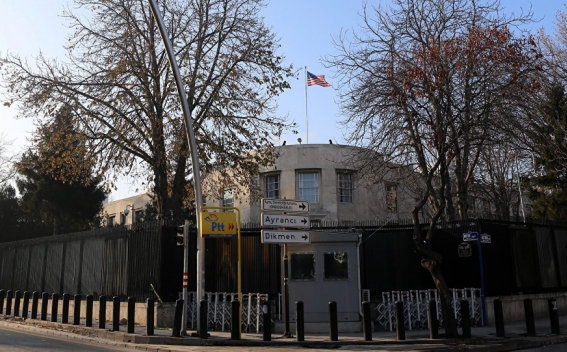Sheesh….of course there was one. The first response was there was no imminent danger but U.S. personnel were to take all precautions and avoid crowded spaces.
Now, the truth comes out.
 Police secure roads around U.S. Embassy in Ankara on Monday. Umit Bektas / Reuters
Police secure roads around U.S. Embassy in Ankara on Monday. Umit Bektas / Reuters
Turkish police foiled a planned Islamic State of Iraq and the Levant (ISIL) attack on the U.S. Embassy in Ankara on March 5, detaining suspects in the capital Ankara and the Black Sea province of Samsun.
The detentions came after the Ankara Governor’s Office stated late on March 4 that extra security measures had been taken in the city upon intelligence that “terrorist actions” could take place in areas where U.S. citizens are located.
“Upon intelligence coming to our units from U.S. sources that terrorist actions could be undertaken targeting the U.S. Embassy and where U.S. citizens are staying, security measures have been reviewed and extra measures have been taken,” the Governor’s Office said.
Embassy closed on March 5, 6
The U.S. Embassy in Turkey announced that it has suspended operations on March 5 and 6 due to an unspecified security threat.
A statement posted on the embassy’s website on March 4 urged U.S. citizens to avoid the embassy in Ankara and large crowds, as well as to “keep a low profile.”
The statement said the embassy will be closed “due to a security threat. The Embassy will announce its reopening, once it resumes services.” It did not give details about the threat.
On March 5, Deputy Prime Minister Bekir Bozdağ said U.S. consulates in Turkey were “operating as normal.”
Four Iraqis detained in Samsun on charges of plotting attack
Meanwhile, four Iraqi nationals were detained in Samsun by the National Intelligence Agency (MİT) and local anti-terror authorities in an operation against ISIL, state-run Anadolu Agency reported on March 5.
Several digital documents were seized in the operation, the agency reported.
The suspects detained on charges of plotting an attack against the U.S. Embassy in Ankara were taken to the police station for formal legal proceedings.
Police detain 12 in Ankara over ISIL links
In addition, the Ankara Chief Prosecutor’s Office said police have detained 12 suspected ISIL militants in Ankara and are searching for eight others.
A statement from the prosecutor’s office said the suspects were detained in a police operation on March 5. It added that all the suspects are foreigners but did not provide detail on their nationalities.
According to the statement, the detained suspects are accused of trying to recruit members for ISIL and were “in contact with people in conflict zones.”
In 2013, a suicide bomber detonated an explosive in front of the U.S. Embassy in Ankara. He killed himself and one Turkish security guard on duty. Turkish officials blamed the attack on domestic leftists.
***
(Reuters) – Turkish police arrested 12 people in Ankara in an investigation targeting Islamic State jihadists, state-run Anadolu news agency said on Monday, hours after the U.S. embassy there said it would remain closed for the day due to a security threat.
The 12 suspects were among 20 people for whom detention warrants were issued by the Ankara state prosecutors’ office, Anadolu said. It said they were foreign citizens and had been seeking to recruit new members to the group.
Turkish authorities regularly detain Islamic State suspects and it was not clear whether there was any connection between the arrests and the U.S. embassy move. Anadolu said the police operation was“planned previously”.
On Sunday evening, the U.S. embassy in Ankara said it would be closed to the public on Monday due to a security threat and only emergency services will be provided.
The Ankara governor’s office said additional security measures were taken after intelligence from U.S. sources suggested there might be an attack targeting the U.S. embassy or places U.S. citizens were staying.
Turkish police increased operations against Islamic State at the end of 2017 before the first anniversary of a New Year gun attack on an Istanbul nightclub in which 39 people were killed.
Islamic State claimed responsibility for that shooting, one of a series of attacks believed to have been carried out by the jihadists in Turkey in recent years.





